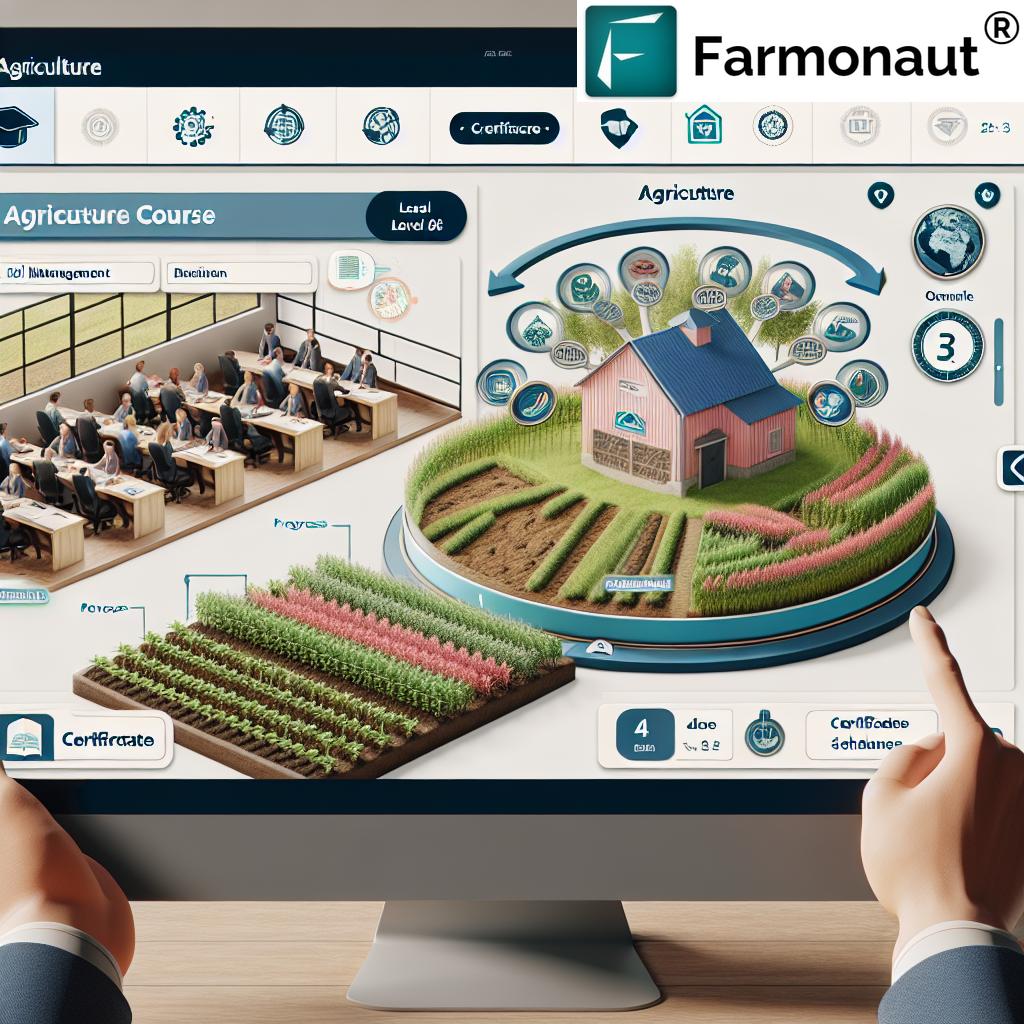Revolutionizing Queensland’s Agriculture: Innovative Financial Solutions for Sustainable Farming
“Queensland’s agricultural sector employs over 300,000 people, contributing approximately $18 billion annually to the state’s economy.”
Welcome to our comprehensive exploration of the evolving landscape of agricultural financial assistance and sustainable farming practices in Queensland, Australia. As we delve into this critical topic, we’ll uncover innovative solutions that are shaping the future of rural development and farm productivity improvements in the Sunshine State.
The Changing Face of Queensland Agriculture
Queensland’s agricultural industry is at a pivotal point. With climate variability and market competition presenting unprecedented challenges, the need for innovative financial solutions and sustainable farming practices has never been more pressing. As representatives of Farmonaut, we’re committed to supporting this transformation through cutting-edge agricultural technology and data-driven insights.
In this blog post, we’ll explore how farm loan programs, agribusiness investment strategies, and climate-resilient agriculture are intersecting to create a more sustainable and productive farming sector in Queensland. We’ll also discuss the role of renewable energy in agriculture and how agricultural technology innovation is driving change across the industry.

The Importance of Agricultural Financial Assistance
Agricultural financial assistance is the backbone of rural development and farm sustainability. In Queensland, where farming is not just a business but a way of life, access to capital can make or break a farm’s future. Let’s explore some of the innovative financial solutions that are revolutionizing the industry:
- Concessional Loans: These loans offer favorable terms to farmers, including lower interest rates and flexible repayment options.
- Income-Contingent Lending: A novel approach that ties loan repayments to farm income, providing a safety net during lean years.
- Flexible Repayment Options: Tailored repayment schedules that account for the seasonal nature of farming and market fluctuations.
These financial tools are designed to address the unique challenges faced by Queensland farmers, particularly in the face of drought, climate variability, and market competition. By providing access to capital with terms that align with the realities of farming, these programs are helping to ensure the long-term viability of the state’s agricultural sector.
Climate-Resilient Agriculture: A Necessity for Queensland
As climate change continues to impact weather patterns and agricultural productivity, the adoption of climate-resilient agriculture practices has become non-negotiable for Queensland farmers. These practices not only help mitigate the effects of climate change but also contribute to farm productivity improvements.
“Climate-resilient agriculture practices can increase farm productivity by up to 30% while reducing water usage by 50%.”
At Farmonaut, we’re proud to offer solutions that support climate-resilient agriculture. Our satellite-based crop health monitoring system provides real-time insights into vegetation health, soil moisture levels, and other critical metrics. This data empowers farmers to make informed decisions about irrigation, fertilizer usage, and pest management, ultimately optimizing crop yields and reducing resource wastage.
Renewable Energy in Agriculture: Powering the Future
The integration of renewable energy in agriculture is another critical component of Queensland’s sustainable farming future. By harnessing solar, wind, and biomass energy, farmers can reduce their reliance on traditional power sources, lower operational costs, and minimize their carbon footprint.
Some key benefits of renewable energy adoption in agriculture include:
- Reduced energy costs for irrigation and farm operations
- Increased energy independence and resilience
- Potential for additional income through energy export to the grid
- Alignment with environmental stewardship goals
Financial assistance programs are increasingly supporting the transition to renewable energy on farms. Grants, low-interest loans, and tax incentives are available to help farmers invest in solar panels, wind turbines, and other renewable energy infrastructure.
Agricultural Technology Innovation: Driving Productivity
Agricultural technology innovation is at the heart of farm productivity improvements in Queensland. From precision agriculture to AI-driven advisory systems, technology is transforming how farmers manage their land and resources.
At Farmonaut, we’re at the forefront of this revolution with our Jeevn AI Advisory System. This AI-driven tool delivers real-time insights, weather forecasts, and expert crop management strategies directly to farmers. By analyzing satellite data and other inputs, Jeevn AI generates customized advice that helps farmers optimize their operations and improve efficiency.
Other technological innovations driving productivity in Queensland agriculture include:
- IoT sensors for real-time monitoring of soil conditions and crop health
- Automated irrigation systems that optimize water usage
- Drone technology for precise crop spraying and yield estimation
- Blockchain-based supply chain management for improved traceability
These technologies not only boost productivity but also contribute to more sustainable farming practices by reducing resource waste and environmental impact.
Agribusiness Investment Strategies: Fueling Growth
Attracting investment into Queensland’s agricultural sector is crucial for its continued growth and innovation. Agribusiness investment strategies are evolving to meet the changing needs of the industry and to capitalize on emerging opportunities.
Key investment areas include:
- AgTech startups developing innovative solutions for farm management
- Sustainable agriculture projects focused on regenerative farming practices
- Value-added processing facilities to increase the profitability of raw agricultural products
- Export-oriented ventures tapping into growing international markets
These investment strategies are supported by government initiatives and private sector partnerships that aim to create a thriving ecosystem for agricultural innovation in Queensland.
Farm Loan Programs: Tailored Financial Support
Farm loan programs in Queensland are evolving to meet the diverse needs of farmers across the state. These programs recognize that one size doesn’t fit all when it comes to agricultural financing. Here’s an overview of some innovative loan structures:
- Drought Recovery Loans: Designed to help farmers recover from prolonged drought conditions, these loans offer favorable terms for restocking, replanting, and infrastructure repair.
- Farm Diversification Loans: Support farmers looking to diversify their income streams by venturing into new crops, livestock, or value-added products.
- Next Generation Loans: Tailored for young farmers entering the industry, these loans often include mentorship programs and lower entry barriers.
- Sustainability Upgrade Loans: Specifically for investments in sustainable farming practices, renewable energy, and water-efficient irrigation systems.
These loan programs are crucial in providing the financial backbone for farm productivity improvements and long-term sustainability. They enable farmers to invest in new technologies, implement climate-resilient practices, and weather the ups and downs of agricultural markets.
Explore Farmonaut’s API for advanced agricultural insights
Environmental Stewardship and Financial Incentives
Environmental stewardship is increasingly recognized as a critical component of sustainable farming in Queensland. Financial incentives are being developed to encourage farmers to adopt practices that protect and enhance the environment. These include:
- Carbon farming credits for sequestering carbon in soil or vegetation
- Biodiversity conservation payments for protecting native habitats on farmland
- Water quality improvement grants for reducing runoff and protecting waterways
- Soil health incentives for practices that improve soil structure and fertility
By aligning financial rewards with environmental outcomes, these programs create a win-win situation for farmers and the environment. They also contribute to the overall resilience of Queensland’s agricultural sector in the face of climate change.

Policy Recommendations for Streamlining Loan Processes
To further enhance the effectiveness of agricultural financial assistance in Queensland, we propose the following policy recommendations:
- Simplified Application Processes: Streamline loan applications through digital platforms, reducing paperwork and processing times.
- Risk Assessment Modernization: Incorporate satellite data and AI-driven analytics in risk assessment to provide more accurate and fair loan evaluations.
- Integrated Support Services: Couple financial assistance with technical support and training to ensure farmers can effectively utilize funds for productivity improvements.
- Collaborative Lending Models: Encourage partnerships between government agencies, private banks, and agtech companies to create innovative financing solutions.
- Long-term Sustainability Metrics: Develop and implement metrics that measure the long-term sustainability and resilience of farming operations as part of loan eligibility criteria.
These recommendations aim to create a more responsive, efficient, and effective system of agricultural financial assistance that aligns with the evolving needs of Queensland farmers.
Encouraging Young Producers: Succession Planning and Support
The future of Queensland’s agriculture depends on attracting and retaining young producers. Succession planning and targeted support for new entrants are crucial components of this effort. Here are some strategies being implemented:
- Mentorship Programs: Pairing experienced farmers with newcomers to share knowledge and best practices.
- Education Subsidies: Financial support for agricultural education and training programs.
- Startup Grants: Initial capital for young farmers to establish their operations.
- Land Access Programs: Initiatives to help new farmers access land through leasing or shared ownership models.
- Technology Adoption Support: Assistance in implementing modern farming technologies to increase competitiveness.
By focusing on the next generation of farmers, these programs ensure the continuity and evolution of Queensland’s agricultural sector.
The Role of Data in Agricultural Financial Decision-Making
In the era of big data and precision agriculture, informed financial decision-making is more critical than ever. Farmonaut’s satellite-based solutions play a pivotal role in this landscape by providing accurate, real-time data on crop health, soil conditions, and weather patterns. This information is invaluable for both farmers and financial institutions:
- For Farmers: Data-driven insights enable better resource allocation, risk management, and strategic planning.
- For Lenders: Accurate farm performance data helps in assessing loan applications and monitoring the health of their agricultural portfolios.
By leveraging this data, we can create more tailored financial products that align with the specific needs and potential of each farm. This data-driven approach not only improves the effectiveness of financial assistance but also contributes to overall farm productivity improvements.
Access Farmonaut’s API Developer Docs for integration possibilities
Comparative Analysis of Agricultural Financial Solutions in Queensland
| Loan Type | Eligibility Criteria | Loan Amount Range (AUD) | Interest Rate (Est.) | Repayment Flexibility | Sustainability Focus | Technology Integration |
|---|---|---|---|---|---|---|
| Concessional Drought Loan | Farms affected by drought | $250,000 – $2 million | 2.11% – 3.11% | High (Interest-only periods) | Climate Resilience | Moderate |
| Income-Contingent Farm Loan | All eligible farms | $100,000 – $1 million | Variable (tied to farm income) | Very High | General Sustainability | High |
| AgTech Innovation Loan | Farms investing in new technologies | $50,000 – $500,000 | 3.5% – 5% | Moderate | Precision Agriculture | Very High |
| Renewable Energy Farm Loan | Farms investing in renewable energy | $100,000 – $1.5 million | 2.5% – 4% | High | Renewable Energy | High |
| Young Farmer Startup Loan | New entrants under 35 years old | $200,000 – $2 million | 1.5% – 3% | High (Deferred payments) | General Sustainability | Moderate to High |
This table provides a comprehensive overview of the diverse financial solutions available to Queensland farmers. It highlights the range of options tailored to different needs, from drought recovery to technology adoption and renewable energy investment. The varying levels of repayment flexibility and sustainability focus demonstrate the evolving nature of agricultural finance in the state.
The Future of Agricultural Finance in Queensland
As we look to the future, it’s clear that agricultural finance in Queensland will continue to evolve. We anticipate several trends that will shape the landscape:
- Increased Integration of Technology: Financial products will become more closely tied to technological adoption on farms, with loans and grants specifically designed to support precision agriculture and data-driven farming practices.
- Climate-Adaptive Financing: As climate change impacts become more pronounced, we expect to see more financial products that are explicitly tied to climate adaptation and mitigation strategies.
- Blockchain in Agricultural Finance: The use of blockchain technology for transparent supply chain management and efficient loan processing will likely increase, improving traceability and reducing fraud.
- Ecosystem Services Payments: Farmers may increasingly be compensated for the ecosystem services they provide, such as carbon sequestration and biodiversity conservation, creating new revenue streams.
- Collaborative Funding Models: We anticipate more public-private partnerships and blended finance models to address the complex challenges facing the agricultural sector.
These trends point towards a more holistic, technology-driven, and sustainability-focused approach to agricultural finance in Queensland.
Conclusion: A Sustainable Future for Queensland Agriculture
As we’ve explored throughout this blog post, the intersection of innovative financial solutions and sustainable farming practices is key to revolutionizing Queensland’s agriculture. From climate-resilient agriculture and renewable energy adoption to cutting-edge agricultural technology and tailored loan programs, the tools for a more productive and sustainable farming future are within reach.
At Farmonaut, we’re committed to supporting this transformation through our advanced satellite-based farm management solutions. By providing farmers with real-time data and AI-driven insights, we’re helping to bridge the gap between financial decision-making and on-farm realities.
The future of Queensland agriculture is one of resilience, innovation, and sustainability. By embracing these innovative financial solutions and sustainable farming practices, we can ensure that Queensland’s agricultural sector not only survives but thrives in the face of future challenges.
FAQs
- Q: What types of financial assistance are available for Queensland farmers?
A: Queensland farmers can access various financial assistance programs, including concessional loans, income-contingent lending, drought recovery loans, and grants for sustainable farming practices and technology adoption. - Q: How can farmers in Queensland improve their climate resilience?
A: Farmers can improve climate resilience by implementing sustainable farming practices, adopting precision agriculture technologies, diversifying crops, and investing in water-efficient irrigation systems. - Q: What role does technology play in modern Queensland agriculture?
A: Technology plays a crucial role in modern Queensland agriculture, from satellite-based crop monitoring and AI-driven advisory systems to precision farming equipment and blockchain for supply chain management. - Q: How can young farmers get support to enter the agricultural industry in Queensland?
A: Young farmers can access support through specialized loan programs, mentorship initiatives, education subsidies, and land access programs designed to facilitate entry into the agricultural sector. - Q: What are some emerging trends in agricultural finance in Queensland?
A: Emerging trends include climate-adaptive financing, increased integration of technology in financial products, blockchain-based solutions, and payments for ecosystem services provided by farmers.
















